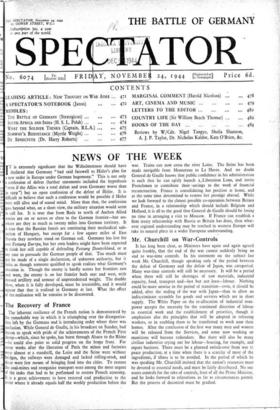The Recovery of France
The inherent resilience of the French nation is demonstrated by the remarkable way in which it is triumphing over the disorganisa- tion left by the Germans and is introducing order where there was confusion. While General de Gaulle, in his broadcast on Sunday, had reason to speak with pride of the achievements of the French First Army—which, since he spoke, has burst through Alsace to the Rhine —he could also point to solid progress on the home front. For some weeks after the liberation of Paris the mines and factories were almost at a standstill, the Loire and the Seine were without bridges, the railways were damaged and lacked rolling-stock, and there were few means of bringing food into the cities. To restore the coal-mines and reorganise transport were among the most urgent of the tasks that had to be performed to restore French economy. It is a great achievement to have restored coal production to the Point where it already equals half the weekly production before the
war. Trains can now cross the river Loire. The Seine has been made navigable from Montereau to Le Havre. And no doubt General de Gaulle knows that public confidence in his administration is such that he can safely launch arLiberation Loan, and invite Frenchmen to contribute their •savings to the work of financial reconstruction. France is consolidating her position at home, and at the same time determined to restore her prestige abroad. While we look forward to the cldsest possible co-operation between Britain and France, in a relationship which should include Belgium and Holland, it is all to the good that General de Gaulle should be losing no time in arranging a visit to Moscow. If France can establish a firm treaty relationship with Russia as Britain has done, then what- ever regional understanding may be reached in western Europe will take its natural place in a wider European understanding.


























